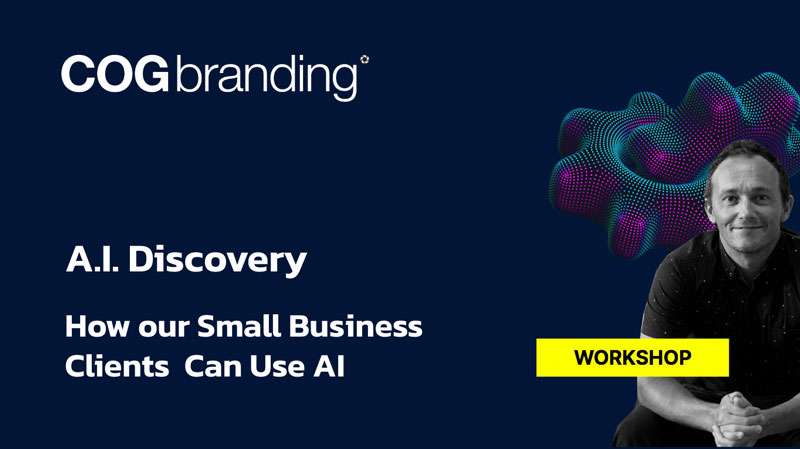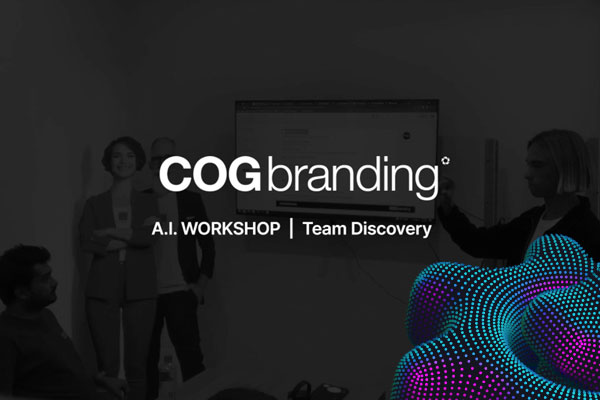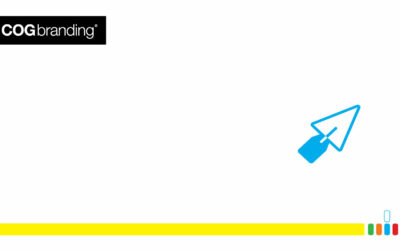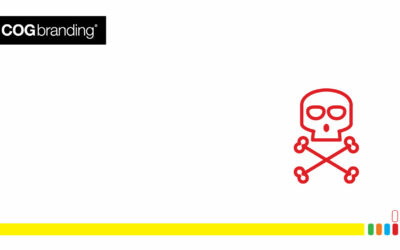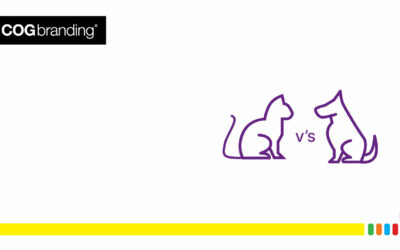The power of AI, or artificial intelligence, is something that Small Business in Australia can find very useful. With some guidance from a leading Sydney marketing agency like COG Branding you can utilise AI to assist your small business perform and grow.
COG Branding is the brand marketing agency for Australia’s small business community. Our focus is to combine the strength of emotion in branding and the power of technology. Then we aim to create a sustainable future for your business. We recently had a team workshop to look at how AI will impact small business in 2023.
We gave the COG Branding team the following brief –
- Choose a tool from our Top 100 AI Tools list that will slot into one of our exisiting processes that the COG Branding business can use.
- Ideally, the tool of choice should be selected to enhance the output of your own team (ie: image creation for Team C).
- Must provide the COG Branding Process Name it’ll be used in (ie: SoMo, MagicMile).
- Must provide how much time saving the tool will provide.
- Must validate the use of it against a client example.
The video below is a candid summary of the excursion by a Sydney brand marketing agency into artificial intelligence.
Firstly, what is AI?
AI, or artificial intelligence, refers to the simulation of human intelligence in machines that are programmed to perform tasks that would typically require human intelligence to accomplish. AI encompasses a range of technologies, including machine learning, natural language processing, computer vision, robotics, and expert systems.
Machine learning, one of the most common forms of AI, involves training algorithms to learn patterns in data and make predictions or decisions based on that learning. Natural language processing involves teaching machines to understand and respond to human language, while computer vision involves teaching machines to interpret and analyse visual information.
Overall, AI is a rapidly advancing field with the potential to revolutionise many industries, from healthcare to finance to transportation, and beyond.
How can small business use AI
Small businesses can use AI in a variety of ways to improve efficiency, reduce costs, and enhance the customer experience. For the most part time is key, how much you can save using technology is a great place to start.
Personalised marketing can utilise AI, and a small businesses can use AI to great effect to analyse customer data and create personalised marketing campaigns based on individual preferences and behaviours. This can help increase customer engagement and loyalty. COG Branding have a core focus to turn customers in to brand advocates over time, and here direct marketing communications at scale using AI is a great opportunity.
The rise of chatbots has created an environment online with automated response that are not always delivering the human touch. Small Aussie businesses can use AI-powered chatbots to handle customer service inquiries and automate routine tasks. This again saves time and resources and provide customers with quick and efficient service. While Chatbots are a great use of automation, you will need to rely on advanced AI to ensure the response is as natural and authentic as possible to ensure you’re treating your customers as best as possible.
Here are a couple more examples of how a small business can use AI:
- Sales forecasting: AI can be used to analyse sales data and make accurate sales forecasts, helping Australian small businesses optimise inventory and plan for the future.
- Fraud detection: AI can be used to detect and prevent fraud in financial transactions, protecting small businesses from financial losses.
- Process automation: Small businesses can use AI to automate repetitive tasks such as data entry and invoicing, freeing up time for employees to focus on higher-value tasks.
In summary, AI can help small businesses become more efficient, competitive, and innovative, allowing them to grow and succeed in today’s fast-paced business environment. There are numerous ways small business can use AI, so get in touch with COG Branding if you have any questions by calling (02) 9523 6007 visiting this link here https://cogbranding.com.au/contact/.
Should small business owners be scared of AI, and will AI take our jobs?
Small business owners should not be scared of AI, but rather should view it as an opportunity to improve their operations, gain a competitive edge, and deliver better value to customers. While there may be some short-term disruption as AI technologies are adopted, the long-term benefits are likely to outweigh the costs. If you fear artificial intelligence will take your job, read here.
As for the concern that AI will take our jobs, it’s important to recognise that AI is not a substitute for human intelligence and creativity. Instead, it is a tool that can augment and enhance human capabilities, allowing us to be more productive, efficient, and effective in our work.
While some jobs may be replaced by AI, new jobs will also be created to design, implement, and maintain AI systems, as well as to provide more personalised and high-touch services that require human interaction and empathy. It’s important for small business owners to stay informed about AI developments and to invest in training and education for themselves and their employees to ensure they are well-prepared for the future of work.
What are some of the tasks that AI can assist small business with?
There is a wide range of tasks that AI can assist small businesses with, though there is so many different tool out there you will want to have a very clear brief in which you are trying to achieve before you begin researching what AI tolls to use. Some the tasks that AI can assist small business include:
- Customer service: AI-powered chatbots can handle routine customer service inquiries, freeing up staff to focus on more complex issues.
- Marketing: AI can analyse customer data to create personalised marketing campaigns and recommend products or services based on individual preferences.
- Sales forecasting: AI can analyse sales data and make accurate sales forecasts, helping small businesses optimise inventory and plan for the future.
- Accounting and bookkeeping: AI can automate tasks such as data entry, invoicing, and financial reporting, saving time and reducing errors.
- Process automation: AI can automate repetitive tasks such as data entry and scheduling, freeing up time for staff to focus on higher-value tasks.
- Fraud detection: AI can analyse financial transactions and detect anomalies or patterns that suggest fraudulent activity, helping small businesses protect themselves from financial losses.
- Inventory management: AI can monitor inventory levels and predict demand, helping small businesses optimise stock levels and reduce waste.
Obviously artificial intelligence will drive any small Australian businesses to become more efficient, competitive, and customer-centric, allow growth and success in today’s fast-paced business environment. Though it’s also critical that the level of sophistication is equal to the actual capacity for the small businesses humans in the business. The shoe needs to fit when onboarding AI solutions..
For starters, here is a list of the top 10 AI tools a small business can use
- Hootsuite Insights: A social media monitoring tool that uses AI to analyse customer conversations and sentiment on social media.
- Salesforce Einstein: A CRM platform that uses AI to analyse customer data and provide insights and recommendations to sales and marketing teams.
- Grammarly: A writing assistant tool that uses AI to check grammar, spelling, and punctuation, and suggest improvements to writing.
- Canva: A design platform that uses AI to suggest design elements and layouts based on user preferences and behaviour.
- Zoho Inventory: An inventory management tool that uses AI to monitor inventory levels and predict demand, helping small businesses optimise stock levels and reduce waste.
- QuickBooks: A finance and accounting tool that uses AI to automate tasks such as data entry, invoicing, and financial reporting, saving time and reducing errors.
- Google Analytics: A web analytics tool that uses AI to analyse website traffic and provide insights into user behaviour and preferences.
- Twilio Autopilot: A conversational AI platform that enables small businesses to build chatbots and voice assistants to handle customer inquiries and automate routine tasks.
- Pipedrive: A CRM platform that uses AI to analyse sales data and provide insights and recommendations to sales teams.
- Hopper: A travel booking platform that uses AI to predict flight and hotel prices and recommend the best times to book, saving small businesses money on travel expenses.
What steps can a small business take to gradually implement the use of AI into its business?
Implementing AI into a small business can seem daunting, but there are several steps a small business can take to gradually incorporate AI into its operations. For the most part the best way to to take it slow, and not think you have to become a marketing expert or technologist to implement some basic AI tools.
As one of Sydney’s leading Sydney marketing agencies, COG Branding assist small businesses identify potential use cases before we apply any solutions. We identify areas of your business that could benefit from automation, optimisation or data analysis. This could be anything from automating mundane tasks to using predictive analytics to forecast future trends. They key here is that the business will then need to understand data sets and how to turn them into insight driven decisions for the business.
Our best advice is to start small and begin with a simple use case that can be easily automated or optimised. Like, really small. This will allow you to test the waters and gain experience with AI before investing in more complex solutions. Choosing the right AI solution is critical because if your small business tries to onboard something complicated and a little too advanced, it’ll negatively impact the broader efforts on implementing AI into the business.
SNAPSHOT
- Research different AI solutions that are available in the market, and choose the one that is most appropriate for your business needs and budget, or get in touch with COG Branding to assist in your decision making.
- Get the necessary data: Ensure you have access to relevant data needed for your AI solution. This may require collecting additional data or restructuring existing data sources to fit the AI model.
- Train the AI model: Once you have the necessary data, train the AI model to perform the desired task. This may require some technical expertise or the hiring of an AI consultant.
- Test and refine: Test the AI solution and refine it until it is working as intended. This may require multiple iterations to achieve the desired results.
- Monitor and evaluate: Once the AI solution is in use, monitor its performance and evaluate its impact on your business operations. Continuously refine and improve the AI solution as needed.
Overall, it is important to approach AI implementation gradually and strategically, focusing on one use case at a time and continually evaluating its impact on your business. Small businesses in Australia have a stack of things to gain from embracing AI and associated technology and it’s the future so you should consider implementing AI when developing a marketing plan for your small business.
By strategically using chatbots and customer service automation softwares, small Australian businesses can offer swift and effective customer service for their customers and clients. AI-driven personalised marketing campaigns can help build more meaningful connections with customers and increase brand loyalty (which is the all important human element to brand marketing).
Furthermore, AI-powered content creation tools can streamline the content creation process, saving businesses time and money. Here you can use a brand design agency like COG Branding to their fullest potential and not some of the more basic tasks that may be able to be completed within the business.
It’s obvious that AI will revolutionise the way small businesses operate, as it will provide a competitive advantage and enabling the company to scale and grow in new ways. So here is the requirement for business owners is to pay attention and look to embrace AI. It’s essential for businesses to stay up to date with the latest advancements in AI and embrace AI-powered tools and platforms to remain competitive and achieve success in the digital age.
If you would like to see the COG Branding team presentation on a PDF, simply email enquiries@COGbranding.com.au with “AI Presentation” in the subject line.
